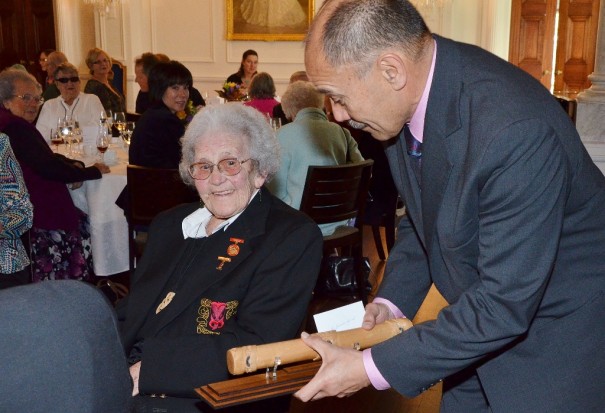Age Concern Luncheon

E kui mā, e koro mā, tēnā koutou, tēnā koutou tēnā tātou katoa. Naumai haere mai ki Te Whare Kawana ki Te Whanganui-a-Tara.
Ladies and gentlemen, greetings to you all and welcome to Government House.
I specifically acknowledge John Gibbons, Executive Officer for Age Concern, and Melva Howard and Monica Robinson, co-ordinators of Age Concern’s visitor services.
I am very pleased to welcome our city’s senior citizens and their visitors from Age Concern to Government House today.
Unfortunately, I’m unable to stay on after my welcome. I have a nasty cold and I do not want to share it with you. What we can do though is share lunch. There is also an opportunity for you to see a little more of Government House while you are here.
This year, we at Government House have been thinking a lot about our history. New Zealand has some big anniversaries in 2015 - the 175th anniversary of the signing of the Treaty of Waitangi, 150 years since Wellington became the Capital; 100 years since the Gallipoli landings; and 70 years since the end of the Second World War.
There has been huge change in New Zealand over that time. We have lived through some of the big defining events of the twentieth century, and many of you have experienced how much our country has changed.
Your personal stories are intertwined with that history.
For example, Ernie Sellens who is with us today was born in 1913. Ernie has first-hand experience of what life was like for a child in New Zealand after the First World War.
Ernie and others of you lived through the Great Depression, the Second World War – and then enjoyed the comparatively good times of the 1950s and 60s.
Over time, you’ve seen many Governors-General come and go. If you go along the corridor later, you will be able to see photographs of them all.
On a social level, you will know how much more mobile people are than they were 50 years ago, and how families are scattered around the planet.
As a result, it can be harder to stay in touch, to be there for one another.
What has not changed over time, and never will change, is our need to connect with other people. It’s absolutely essential for our health and wellbeing.
You may have been wondering why it is we invited you to Government House today. Simply put, it’s because people are important. I was dismayed to learn that so many of our senior citizen are isolated and without regular contact with others.
In March this year, Dean Stewart’s body lay for up to a month in the Wellington City Council’s Granville Flats, in the same flat where Wiremu Whakaue’s body was discovered after eight months in March 2010. In my view, all of us in our communities should make the effort to ensure there is more regular contact with our elderly citizens.
Ideally, all New Zealanders would take on the responsibility of checking up on their neighbours, their friends, and on people they know who are living alone. Sometimes that happens, sometimes it does not.
Orson Welles, the great film-maker once said “When you are down and out, something always turns up – and it is usually the noses of your friends”. But true friends, who don’t snub you, are great, especially when the chips are down. The reality for us all is what happens when you feel like you’re the only one left?
We can be deeply grateful that there are wonderful people who appreciate it is important to keep an eye out for their fellow citizens and help them in any way that they can. People like the volunteer visitors at Age Concern.
I want to acknowledge Age Concern’s work to help reduce the social isolation of our city’s elderly. Age Concern performs a tremendous public service in providing advice and support on a range of issues of concern to our senior citizens. .
It’s also pleasing to know that the Wellington City Council is doing some great work with senior citizens living in Council flats. I was most interested to learn of the Prime Timers group – for the over 80s. They’re getting together and spending time doing things they enjoy, including excursions. I understand the Prime Timers did a tour of Government House last month.
I am aware that some of Age Concern’s clients could not be here because they are housebound. So I hope some of you will let them know what we did here.
Finally, welcome again to everyone. I appreciate that it might have been a real effort for some of you to get here today. I hope you enjoy your lunch, and the opportunity to meet new people, make new friends and to look around Government House.
Kia ora huihui tātou katoa
